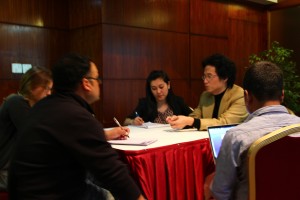Moving forward in fighting online hate speech and excessive surveillance: Suggestions and solutions from #SAFoE
by Richa Kaul Padte
This blog post is seventh in a series of ten blog posts to report on the 'Third South Asian Meeting on the Internet and Freedom of Expression' recently concluded in Dhaka, Bangladesh.
The final session of the meeting provided an opportunity for participants to work in small groups and develop strategies and ideas for taking forward key issues raised over the two day conference. Following the discussions, a summary of each group’s findings and suggestions was reported back to the wider meeting.
The first group sought to address the issue of anonymity, using the following question as its guideline: should we have protection for anonymity in a South Asian context, and if so, in what situations do we feel anonymity needs to be protected, and how?
Defining anonymity is essential to developing strategies to protect it, and participants see anonymity as the ability to do something without identifying yourself, an effacing of the connection between yourself and the presence you have online.
Real-name registration is being implemented in different ways in various countries across South Asia, including providing identification at cyber cafes in India and Nepal and the requirement of real names and addresses for mobile phone registration in most countries. Therefore, in countries that do not have privacy laws, it is easier for the government to track individuals without their consent.
There is a need to question the assumption that anonymity leads to a lack of accountability, because even if you remain anonymous online, there are traditional methods of crime investigation (through warrants, etc) that will allow the government to hold you to account. The methods may take longer, but it does not mean that you are not accountable.
However, it is also important to recognise that anonymity is not limitless, and real-name registration is necessary when the likelihood of harming people is greater (which can be seen in the case of car or gun ownership).
The second topic for discussion that reflected one of the meeting’s key subjects focused around the question: how can law enforcers uphold the right to privacy when designing surveillance and/or security measures?
Participants from the group believe that there should be a constitutional guarantee around data protection and privacy – both online and offline.
There should also be strong resolutions around data sovereignty, where irrespective of where an individual’s data is located or going, it must be protected. However, caution must be exercised when considering data protection laws as a solution, because in their current form, these laws give ownership rights to the people who the data is about, not those who created it. Thus, data protection can be in direct conflict with the freedom of speech, and in order to effectively develop useful laws, the distinction between the data about you and the data you create must be clearly made.
The group also advocates a legal framework and judicial oversight to any online investigations.
The issue discussed by the last group was spontaneously developed by participants in response to the stabbing of Bangladeshi blogger Asif Mohiuddin, which occurred in Dhaka on the second night of the conference. Mohiuddin has previously come under sharp criticism – including detention at a police station – for the anti-authoritarian and anti-religious views expressed on his blog. This brutal attack, which was an attempt to take his life, highlighted the pertinence of the conversations and discussions around the freedom of expression online.
Given that the two-day event was due to close with a public meeting at which government officials, specialists, activists and bloggers would be present, a group of participants used this session to develop a statement of solidarity with Mohiuddin, condemning violence against those who voice unpopular opinions.
Participants from the group highlighted that with over 200,000 active bloggers in Bangladesh, it is important to make authorities recognise that an attack on an individual blogger is an attack on the country’s entire blogging community. Some participants believe that the term ‘social media activists’ should be replaced by ‘citizen journalists’, wherein the protection of the freedom of press should be extended to the blogosphere. Participants drafted a statement to be read out at the public meeting. A section from the statement reads:
It is the duty of societies at large to ensure that the principles we universally consider sacrosanct, such as the right to life and liberty and freedom of expression are in fact upheld, and of the government to actively protect the rights guaranteed under the Constitution of Bangladesh and to ensure they are not just words on paper…The attack on Asif Mohiuddin constitutes a violation of these fundamental principle by criminals, and we request the government to act decisively to show it will not tolerate such violations.
The entire statement can be found here.


